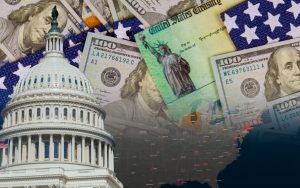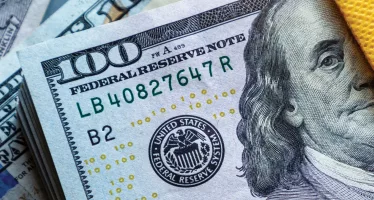Waiting for the Government to Come Knocking
 Streamlined to a skeleton, the US federal government is singularly unable to keep up with politicians eager to dole out trillions of dollars to businesses and individuals caught short by the pandemic. Jolted out of their small-is-beautiful philosophy, lawmakers and administrators suddenly realise that late US President Ronald Reagan may have been wrong when he decreed that government is the source of all evil.
Streamlined to a skeleton, the US federal government is singularly unable to keep up with politicians eager to dole out trillions of dollars to businesses and individuals caught short by the pandemic. Jolted out of their small-is-beautiful philosophy, lawmakers and administrators suddenly realise that late US President Ronald Reagan may have been wrong when he decreed that government is the source of all evil.
Whilst an entire nation waits for someone to come knocking at the door with the words ‘I’m from the government and I’m here to help’, another 6.6 million Americans last week joined the queue to register for unemployment benefits. Since the pandemic hit US shores, now some six weeks ago, more than 16 million workers have lost their job. Trillions of dollars legislated into existence to support the economy whilst the corona virus rages are stuck in a bureaucratic limbo. Just a tiny fraction of the cash has reached the intended recipients. Above all, deliverance requires patience.
The Internal Revenue Service is geared for receiving cheques, not for cutting them. The federal tax apparatus balks at attempts to reverse the flow of cash. The first of the individual support cheques are not expected to reach households before the end of next week. Main street banks suffer the same affliction: used to dwell on the receiving end of bailouts, they find it almost impossible to distribute federal monies amongst their distressed business clients.
Though the Federal Reserve instantly buys up 95 percent of emergency loan portfolios, effectively eliminating all but the tiniest sliver of risk, bank managers who previously had no qualms in dispensing no-doc mortgages, now display a sense of financial rectitude and caution that beggars belief. As a result, the backbone of the US economy is crumbling as untold thousands of small- and medium-sized businesses are being shuttered.
Charged with handling the disbursement of emergency loans via commercial banks, the Small Business Administration (SBA) is struggling to cope with the surge in demand. In normal times, the federal agency guarantees about $30 billion worth of business loans in a year. It now has to process that volume in a single day.
Understaffed and running on a museum-quality computer network huffing and puffing along on Windows XP, the SBA is woefully ill-equipped to respond to any emergency, let alone one of apocalyptic proportions. Whilst in Washington officials celebrate the decisive federal response to the economic fallout of the pandemic, bankers and business owners wonder where the $349 billion earmarked for the SBA languishes. The delay in getting cash out causes a great deal of frustration in the business community, forcing a growing number of entrepreneurs to just turn down the lights and walk away.
Though most lawmakers on the hill understand the need for out-of-the-box thinking, speed, and scale, the structures that must implement their policy initiatives are creaking and buckling under the pressure. Congressional moves to approve another $250 billion in emergency cash for the business community will only add to the systemic stress. Sensing the makings of a much greater than expected cash crunch, Senator Josh Hawley, a Republican from Missouri and until recently a big fan of small government, on Thursday suggested the federal administration cover the payroll of any US business up to 80 percent of the national median wage. However bold an idea for a card-carrying conservative to spout, it came way too late to make any difference outside the Beltway where real misery is spreading almost as fast as the corona virus.
Already over a month ago, a number of European governments moved swiftly to pre-empt an outbreak of mass unemployment by guaranteeing up to 90 percent of the wage bill of private companies in return for a pledge not to lay off workers. In countries such as Austria, Denmark, Germany, The Netherlands, and the United Kingdom the vast majority of furloughed employees did not suffer a dip in their wages which unfailingly arrived on the usual day of the month. Companies were able to suspend operations without much pain or drama, and are preserved in a form of cryogenic suspension, ready to be revived more or less intact once the virus has been contained.
Meanwhile in the US, President Donald Trump chose to ignore the lengthening breadlines and merrily announced the imminent arrival of an economic ‘boom’. At Moody’s Analytics, forecasters have their doubts and expect another 30 million or so Americans to lose their job in the weeks ahead before the market bottoms out.
In Europe, a cautious optimism was palpable after Eurozone finance ministers on Friday agreed on a €500 billion bailout programme for countries that need additional support to deal with the pandemic. Italy and The Netherlands buried the hatchet and decided to kick the proverbial can down the road, agreeing not to mention the word ‘eurobond’ for the time being. Italy got the easy access it wanted to the €410 billion European Stability Mechanism (ESM) fund from which the country may obtain up to €38 billion without the need to promise reform or accept oversight. The Netherlands also got what it wanted and need not worry about the mutualisation of sovereign risk: eurobonds are off the table.
Agreement was possible only after Austrian Finance Minister Gernot Blümel publicly came out in support of his beleaguered colleague Wopke Hoekstra, saying that the Dutchman did not stand alone in his rotund rejection of eurobonds: “The perception that The Netherlands is the only country to oppose the issuance of shared debt does not reflect reality. In fact, Austria supports the Dutch on this, as do many other Eurozone member states that are in no mood to make any concessions on eurobonds.” Minister Blümel explained that whilst ‘everybody’ wants to help Italy, Spain, and others deal with the economic consequences of the pandemic, this support cannot undermine the financial resilience of the fiscally more frugal Eurozone members.
After the deal had been sealed, Mr Hoekstra tweeted that EMS funds are available without strings attached to cover medical expenses: “Funds will also be available for economic support, but with conditions. That’s fair and reasonable.” He also reiterated that his government remains opposed to eurobonds or any other form of mutualised debt.
Whilst despised in the south, the unflappable Dutch finance minister received much, albeit muted, applause elsewhere in the union for remaining perfectly calm in the face of Italian theatrics. Prime Minister Guiseppe Conte did not help himself, or his country, by loudly proclaiming just before the Friday meeting got underway that the recalcitrant Dutch were pushing the European Union over the edge of a precipice. Though supportive of eurobonds and critical of the Dutch position, the finance ministers of Spain, Portugal, and France ultimately failed to back up Italy, realising full well that Mr Hoekstra also acted as a proxy for Germany – the arbiter of last resort in nearly all European matters.
Whilst Rome may be more distant than ever, The Hague has now solidified its position as the leader of the frugal bloc, aka the Hanseatic League 2.0, the informal collective of eight Eurozone member states share an appreciation for fiscal prudence. Thus, The Netherlands has neatly slipped into the rebel-with-a-cause position vacated by the British after the UK left the European Union earlier this year.
You may have an interest in also reading…
Buffett’s Annual Letter 2024: Berkshire Hathaway’s Record Cash Pile, Japan Bets, and Tax Message
Warren Buffett’s latest annual letter to Berkshire Hathaway shareholders confirms that the Omaha-based conglomerate is sitting on a record-breaking USD
Otaviano Canuto: The Dollar’s ‘Exorbitant Privilege’ Remains
Otaviano Canuto discusses the ongoing role of the greenback in international monetary systems… There has been talk of “de-dolarisation” of
World Bank on COVID-19: The Road Back Must Be Green, Resilient, and Inclusive
By Axel van Trotsenburg World Bank Managing Director of Operations COVID-19 has imposed a deeper, more widespread shock than the


















































































